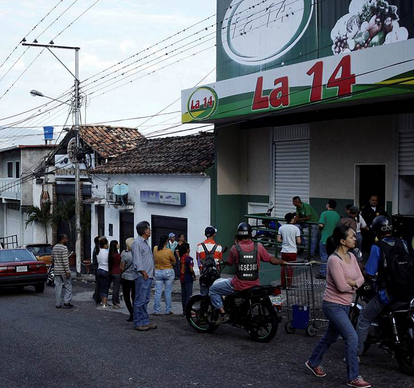Venezuelan food store owners arm themselves against looters as the inflation rate tops 2,600%
A wave of looting by hungry mobs across Venezuela has left streets of shuttered shops in provincial towns and pushed some store owners to arm themselves with guns and machetes.

Shopper wait outside shuttered grocery store in San Cristobal.
Worsening food shortages and runaway inflation have unleashed the spate of pillaging since Christmas in the South American country, in which seven people have reportedly died.
The unrest was sparked by shortages of pork for traditional holiday meals, despite socialist President Nicolas Maduro’s promise of subsidized meat to alleviate shortages.
Looters have ransacked trucks, supermarkets and liquor stores across the nation of 30 million people, which ranks as one of the most violent in the world.
The plunder is heaping more pain on battered businesses, raising questions about how much longer they can survive.
Once one of Latin America’s richest countries, Venezuela is suffering a fifth straight year of recession and the world’s highest inflation rate, which the opposition-run Congress says topped 2,600 percent last year.
In the first 11 days of January alone, some 107 lootings or attempted lootings have taken place, according to the Venezuelan Observatory for Social Conflict, a rights group.
In one of the most dramatic incidents, a mob slaughtered cattle grazing in a field in the mountainous western state of Merida.
Skeptical that authorities can protect them, shopkeepers in the Andean town of Garcia de Hevia in the neighboring state of Tachira have taken matters into their own hands.
“We’re arming ourselves with sticks, knives, machetes, and firearms to defend our assets,” recounted William Roa, who owns a restaurant and liquor store and is also president of the local shopkeepers’ association.
Roa estimated that more than two-thirds of stores in the small town near the Colombian border were shut.
In Ciudad Guayana, a former industrial powerhouse on the Orinoco river in eastern Venezuela, many stores remain closed after a wave of nighttime lootings.
Garbage fills the streets and few cars circulate, though buses crammed with people crisscross town looking for places to buy food.
Businessmen in Caracas now fear the lootings, so far concentrated in the poorer and more lawless provinces, will spread to the sprawling capital, with its teeming hillside slums.
The owners of patisserie Arte Paris, in the city’s gritty downtown, reinforced the storefront with metal shutters last month. They now only stock ingredients like sugar for a handful of days and have considered hiring a costly nighttime security guard.
“The fear is real,” said Sebastian Fallone, one of the owners, as men and children begged patrons for food. “I leave at night without knowing what I will find the next morning.”
Government critics say Maduro’s refusal to reform the OPEC nation’s floundering economy is to blame for the chaotic fight for survival in the country home to the world’s largest crude reserves.
With a presidential election looming this year, Maduro retorts that Venezuela’s oil-reliant economy is under attack by U.S.-backed saboteurs seeking to stoke conflict and discredit socialism in Latin America.
While videos of ransacking have gone viral, Maduro’s government has stayed largely mum. The Information Ministry did not respond to a request for information on the scale and impact of the looting.
In an effort to curb voter anger over inflation, the government agency tasked with ensuring “fair prices” ordered some 200 supermarkets to slash their rates this month, triggering frenetic buying.
Roadside lootings have also scared truck drivers, disrupting the food distribution chain that is traditionally slower anyway in January because of holidays.
_________________
Credit: NBC News, www.nbcnews.com




















